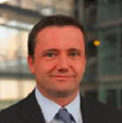Sanofi Pasteur spent 20 years and $1.5 billion researching its dengue fever vaccine, Dengvaxia, and now it's looking to maximize the vaccine's impact. To do that, the French pharma's vaccine division is working with regulators and health officials to identify implementation strategies, program head Guillaume Leroy told FierceVaccines.
 |
| Sanofi Pasteur's Guillaume Leroy |
Late last year, Mexico, the Philippines and Brazil granted marketing authorizations for Dengvaxia, demonstrating a "trust and conviction" that has been developed for the jab among public health officials, Leroy said. Going forward, he added, Sanofi Pasteur is using mathematical models and conversations with officials to develop individual vaccination campaign priorities and goals.
According to one mathematical model, Leroy said, by vaccinating the 20% of a population most exposed to dengue, a country could reduce its dengue caseload by more than 50% over a 5-year period. However, he stressed, dengue vaccination strategies will likely vary country by country and some authorities may favor a regional approach.
Vaccination strategies incorporating Dengvaxia could be announced in the coming weeks or months, he added. "There is a major sense of urgency to implement the best vaccination program" for the affected populations, Leroy said.
Though he was unable to go into pricing details, Leroy said the company is looking to implement a "predictable, affordable and sustainable" pricing system that will help it assist the WHO in achieving goals to reduce dengue mortality by at least 50% and morbidity by at least 25% by 2020. Leroy has said Sanofi Pasteur will look to "flip the model" for the launch, favoring wide access in endemic countries early in the rollout.
Over a 5-year period, Leroy said Sanofi Pasteur expects "significant demand" for the vaccine, adding that it may distribute between 60 million and 80 million doses annually in the coming years. However, those figures won't likely be reached in 2016, as it is anticipated to be a "transition year." The vaccine requires three doses to confer protection.
In India, the Economic Times reports that Sanofi has received a waiver excluding the vaccine from large-scale local trials, discussions prompted by an outbreak there and in several nearby countries. The waiver reportedly grants authorization for the vaccine for people 18 to 45 years of age and will require postmarketing surveillance.
- here's the Economic Times story
Special Report: The top 5 vaccine makers by 2014 revenue - Sanofi